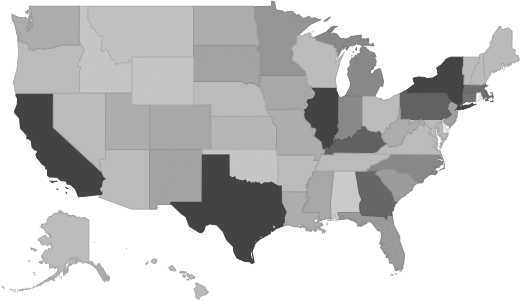2024 Residential Remodelers Industry Research Report
Residential Remodelers - Market Size and Industry Forecast
The 2024 Residential Remodelers Industry Report contains historical and forecasted statistics used by leading private equity firms and consultants. Market sizes from 2019 to 2029 reflect industry trends and growth patterns. Revenues include both public and private companies in the residential remodelers industry.
| Historical | Forecasted |
|---|
| 2019 | 2020 | 2021 | 2022 | 2023 | 2024 | 2025 | 2026 | 2027 | 2028 | 2029 |
|---|
| Market Size (Total Revenue) | 
|
| % Growth Rate |
| Number of Companies |
| Total Employees |
| Average Revenue per Company |
| Average Employees per Company |
Source: U.S. government financial data.Industry Revenue ($ Billions)

Advanced econometric models forecast five years of industry growth based on short- and long-term trend analysis. Market size includes revenue generated from all products and services sold within the industry.
Residential Remodelers - Geographic Breakdown by U.S. State
Market size by state reveals local opportunity through the number of companies located in the region. Each state's growth rate is affected by regional economic conditions. Data by state can be used to pinpoint profitable and nonprofitable locations for Residential Remodelers companies in the United States.
Residential Remodelers Revenue by State

Distribution by Company Size
| Company Size | All Industries | Residential Remodelers |
|---|
| Small Business (< 5 Employees) | 
|
| Small Business (5 - 20) |
| Midsized Business (20 - 100) |
| Large Business (100 - 500) |
| Enterprise (> 500) |
Residential Remodelers - Income Statement (Average Financial Metrics)
Financial statement analysis determines averages for the following industry forces:
- Cost of goods sold
- Compensation of officers
- Salaries and wages
- Employee benefit programs
- Rent paid
- Advertising and marketing budgets
The report includes a traditional income statement from an "average" company (both public and private companies included).
| Industry Average | Percent of Sales |
|---|
| Total Revenue | 
|
| Operating Revenue |
| Cost of Goods Sold (COGS) |
| Gross Profit |
| Operating Expenses |
| Operating Income |
| Non-Operating Income |
| Earnings Before Interest and Taxes (EBIT) |
| Interest Expense |
| Earnings Before Taxes |
| Income Tax |
| Net Profit |
Average Income Statement

Cost of Goods Sold
Salaries, Wages, and Benefits
Rent
Advertising
Depreciation and Amortization
Officer Compensation
Net Income
Residential Remodelers - Financial Ratio Analysis
Financial ratios allow a company's performance to be compared against that of its peers.
| Financial Ratio | Industry Average |
|---|
| Profitability Ratios | 
|
| Profit Margin |
| ROE |
| ROA |
| Liquidity Ratios |
| Current Ratio |
| Quick Ratio |
| Activity Ratios |
| Average Collection Period |
| Asset Turnover Ratio |
| Receivables Turnover Ratio |
| Inventory Conversion Ratio |
Residential Remodelers - Compensation and Salary Surveys
| Title | Percent of Workforce | Bottom Quartile | Average (Median) Salary | Upper Quartile |
|---|
| Management Occupations | 10% | 
|
| Chief Executives | 0% |
| General and Operations Managers | 3% |
| Other Management Occupations | 6% |
| Construction Managers | 6% |
| Construction Managers | 6% |
| Office and Administrative Support Occupations | 13% |
| Construction and Extraction Occupations | 63% |
| Supervisors of Construction and Extraction Workers | 9% |
| First-Line Supervisors of Construction Trades and Extraction Workers | 9% |
| First-Line Supervisors of Construction Trades and Extraction Workers | 9% |
| Construction Trades Workers | 52% |
| Carpenters | 28% |
| Carpenters | 28% |
| Construction Laborers | 16% |
| Construction Laborers | 16% |
Government Contracts
In the past, the federal government spent an annual total of
$100,665,932 on the residential remodelers industry. It has awarded 995 contracts to 163 companies, with an average value of $617,582 per company.
Residential Remodelers and Adjacent Industries - Top Companies
| Company | Address | Revenue
($ Millions) |
|---|

|


